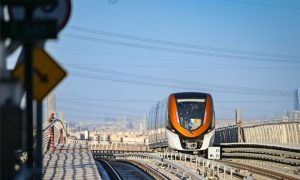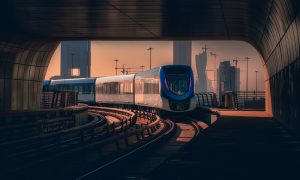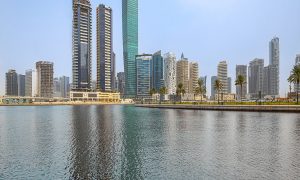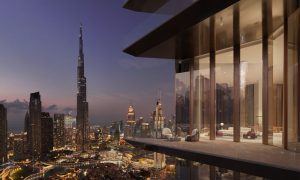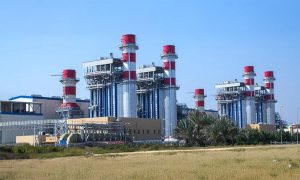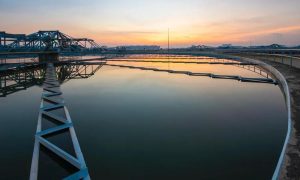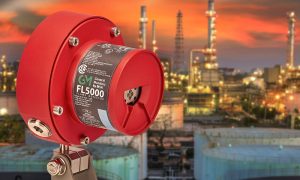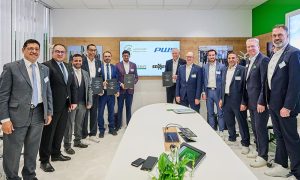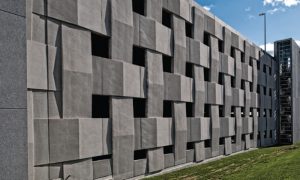CH2M’s Neil Reynolds: The man who means business in the Middle East
Regional boss of engineering consulting firm describes the opportunities in this market

Having worked on projects in over 90 countries across the world over his career, Neil Reynolds is a man who means business. A chartered civil engineer by trade, Reynolds has worked his way up from site engineer to his current role as senior vice president and managing director of CH2M in the MENA region.
Over the years, he has spent a good deal of his career in Africa, Europe, Asia Pacific and the Middle East, and has a wide range of technical and sectoral expertise which includes areas like transportation, tunnelling, water resources and ecosystem management, as well as project and programme management.
To top it all off, Reynolds is able to provide a diverse outlook on every project, based on the fact that he has not only worked as a consultant but has been on the contracting and engineering side too.
Middle East Consultant caught up with Reynolds to talk about his journey and the direction he is moving CH2M MENA towards.
“I think my experience with so many different cultures has shaped me as a person. When I moved down to the Middle East, it was pretty easy for me to merge with the environment here because it is so multicultural. I’ve been at CH2M for about eight years and in this part of the world with them for about four years now.
“Prior to my current role, I was based in London and headed CH2M’s global water business outside North America. It was at the point when we acquired Halcrow that I was asked to come to the Middle East and integrate them and another acquisition – VECO, an oil & gas company based in Abu Dhabi – into our business. This integration into one brand and culture took place over one and half years, and now we’re a 2,000-member team.”
Today, CH2M is not just a 70-year-old firm founded by three Oregon state college graduates and their civil engineering professor. It is a global company with over 5,000 clients, $5.4 billion in revenues in 2015 and nearly $2.8 million in total assets.
Its Middle East unit, for one has moved from strength to strength, enabling them to work on a number of unique projects like Masdar, the STEP sewer tunnel in Abu Dhabi and more lately Expo 2020 and the 2022 World Cup.
Given the progress they’ve made under Reynolds’ leadership, what is the philosophy that has propelled its growth?
“It’s quite simple,” he says. “Our philosophy as a company is basically bringing in the best of what we have globally and combining that with our local knowledge and capability to get the best client solutions.”
“We’re very client-centric in everything we do. We don’t take positions where we tell clients what they need; rather, we listen to what they have to say and then work with them towards solutions together. Some clients obviously want that one-stop shop and we can pretty much offer them a range of services either singularly or combined all together.”
With a wealth of experience under his belt, Reynolds knows opportunity when he sees it, and it’s this trait that has enabled him to identify a number of potential growth areas for the construction industry in the Middle East. For instance, one key trend he sees across a number of countries here and in India is manufacturing and industry.
Depending on the country, he says the strategy goes from precision manufacturing in places like the UAE to more general manufacturing in Saudi Arabia. This cuts across sectors like pharmaceutical, metals, life sciences and automotive.
In fact, he believes that even big data has huge business potential, as a lot of data collection on how to manage infrastructure is taking place.
Naturally, with any kind of manufacturing base comes the need for transport hubs as well, which brings opportunities for the development of airports, ports and rail.
Illustrating the point further, Reynolds says, “Rail may have slowed down in the Middle East because of the cost of capital, but other trends could emerge from it, like PPP. In the Middle East, private finance was only ever big in the areas of electricity and water, but now it’s moving to other areas like rail and that’s a trend that can pick up too.”
“In terms of the countries that are accelerating these plans in, and that we find attractive because of the services that we provide, are Saudi Arabia, the UAE and even Kuwait. In fact, Kuwait has always set its budget around the $50 oil per barrel mark so it has amassed funds where they can spend on developing infrastructure.
“I think Kuwait will also take advantage of the fact that there is a slowdown in the region. This means increased competition among players who will vie with each other to provide services for them, so I think the Kuwaitis are definitely going to jump on that bandwagon.”
He even sees great prospects in India, which falls under CH2M’s remit. For one, PM Modi’s ‘Make in India’ initiative, a national programme designed to facilitate investment, encourages manufacturing in the country. The initiative spreads across areas such as automobile, aviation, IT and Business Process Manufacturing (BPM) and thermal power, and naturally presents the opportunity to set up these industrial units. There are also a lot of mega-trends around smart cities and the need for synergistic transport hubs too.
Taking the topic of smart and sustainable cities further regarding the Middle East, Reynolds says that CH2M has a strategic initiative in place called Great Cities Solutions. It allows CH2M to leverage their broad expertise in design, engineering, construction development, programme management and technology services to serve growing urban centres.
“We’re delivering solutions for water conservation and replenishment, food storage and resiliency in cities like London and Los Angeles. I believe we can take our learnings from there to implement similar ones for the smart city initiatives in places like Dubai and a number of cities in India.”
In fact, even within smart cities there are other development prospects, says Reynolds.
“For example, multi-modal transportation is a chance to develop new mobility solutions. Even the massive amount of waste created by cities provides us with an opportunity to create environmental solutions for it. What has always done well for business is that we aren’t looking at all these things individually but holistically.”
Naturally, any smart city will need to be powered by technology, and this will involve a large amount of data mining to understand its future needs. Reynolds says that Dubai is ahead of other cities in this respect because of its initiative around big data, where the government is looking to leverage big data for operational and analytical purposes.
In fact, this kind of data collection will help the city better plan and conceptualise urban infrastructure as well as make smarter decisions around mobility. CH2M has a foothold in this area too, says Reynolds, where they have plug and play type of solutions.
“A lot of clients want quick solutions, so we often team up with companies who are technology providers to do this. It’s not necessarily our own technology, but we are the overall influencers.
“In fact, one of the data centres that we’re working on in the Middle East today is a plug and play solution that can get clients online quicker. Additionally, we also have a patent pending for our modular data centre.”
3D visioning is another area of technology that interests CH2M, given the amount of opportunity that comes along with it. Reynolds believes that it will be especially helpful in the construction of industrial facilities, where there are often clashes given the need for access requirements. This can be difficult due to the presence of pipes, racks and equipment that can hinder a project’s progress.
This technology also allows people to study the details of a construction before it actually starts, thereby lowering the likelihood of mistakes. Construction timelines are shorter as well, and there are more prospects for modularisation too.
“In Dubai there is a 3D printing facility, and in Singapore there is a virtual facility where you can walk into a room and see what you’re going to end up with as a finished product. On a smaller scale, we’ve done something similar with rail where we’ve taken clients into virtual rooms that are essentially a walk-through of a project. I think that at the rate technology is developing, ultimately one day, with the exception of ground conditions, you may very well be able to go onto the internet and order a multi-storey building.”
In terms of interesting developments, Reynolds says that at any moment CH2M is working on around 600 projects. Talking about a couple of them in detail, he says it’s working on the Dubai Canal, which he believes is going to create immense value for the city in terms of being not only an attractive public space but also boosting the value of real estate around it.
The Riyadh Metro is another interesting development for CH2M, but the two projects that really stand out for the company are Expo 2020 and the 2022 World Cup in Qatar.
These two mega events require large-scale infrastructure delivery and programme management, both core strengths of CH2M.
“Given our role as delivery partners, we can actually bring our best people onto these projects. In both cases, you could consider us the trusted advisor of the client. What I particularly like about these two projects is that because of our past track record of similar events like the 2012 Olympics in London, we’re able to actually tailor our solutions to the client’s needs.
“I think we’re fortunate to be involved in events that will literally be drivers of development in Dubai and Doha. If you look at Qatar, all the infrastructure development that we’re seeing today is all a result of the upcoming World Cup.
“Similarly, the current dynamics in Dubai are also a result of Expo 2020, where a lot of the infrastructure is supporting this event. In terms of the site itself, the enabling and ground works for Expo are already underway as well. I think no matter what the oil price is, these two events will happen and have to get completed.”
Sharing his thoughts on the impact of recent geo-political events in the region and the impact of falling oil prices, Reynolds says chances are black gold may never return to its original levels. This means that everyone will need to consider this the new normal and work around it.
He explains that governments will need to transform and adjust their fiscal policies to cut spending, and while this will have an impact on infrastructure in some cases, it isn’t a point to be alarmed over.
“Governments are now looking to raise taxes and are looking to increase borrowing, which again creates opportunities because the bond market or alternative finance is back on the table. As a company, we advise clients in terms of alternative finance, so that’s another aspect that could be a growing business for us. Basically, I know if one hand is down the other hand is up, and I don’t think we all need to panic about the situation. I think it just creates new opportunities for companies like us to continue to prosper in the region.”
Given global events like these and other factors, demand and expectations from clients are evolving as well and consultants have to adapt in response.
One challenge consultants are facing while doing this is finding the right talent, says Reynolds. As a company, he says CH2M is focused not only on the talent that they hire but where this talent is going to help them stay competitive.
He says, “Companies like ours need to be continuously upgrade our services to stay on top. We always look to see how we can enhance our project and programme management skills to stay competitive in the region. With other nations wanting to do business with the Middle East, we hope that clients will continue to focus on quality as opposed to low cost. This goes back to our client-centric approach.”
“What we can see is that as we work and go deeper with fewer clients, our successes with them are increasing. We’re very involved and focused on the clients that value our services.”
Sharing his outlook on 2016, Reynolds predicts that it will be tough, but having said that, he says CH2M has a strategy that aligns to the national development plans and visions of the GCC countries. It is because of this that it has been able to adjust itself and continue to grow.
He reiterates that he sees manufacturing increasing, which is a good thing. Interestingly, with the security threats in the region, there are opportunities for the development of military infrastructure. This could range from buildings, to heavy civil engineering, to the need for air strips and hangars.
Civilian airports and ports will also be needed, with the growth of tourism and trade.
“Aviation is another big sector and we’re working on the Al Maktoum airport at the moment. In fact the entire aerotropolis around Jebel Ali and Al Maktoum airport is again another key catalyst for the growth of Dubai. Ports is also going to grow as well. In fact, our ports business is probably one of our fastest growing areas.
“Lastly, picking up on India, the country has always been a focus for the company. I don’t look at it as a contingency to a slowdown in the Middle East, but as an opportunity in itself. We will continue to focus our efforts on growth in India across airports, ports and security, which is favourable to what we offer as a company.”
